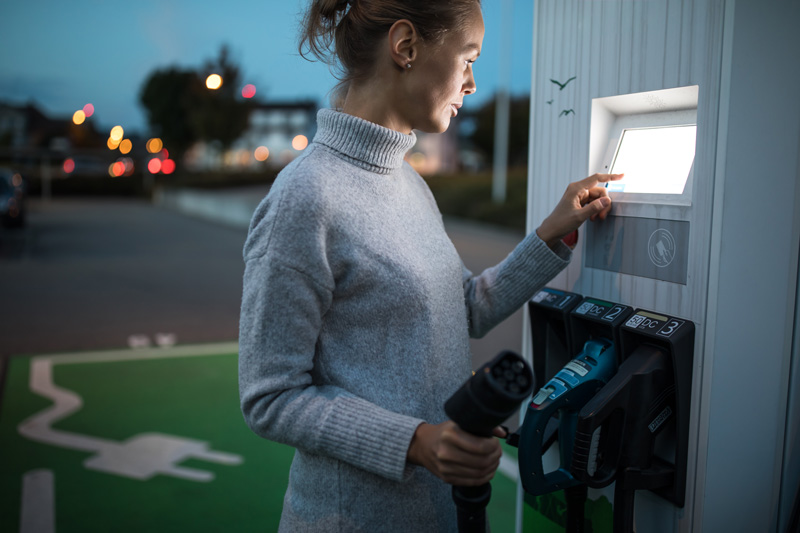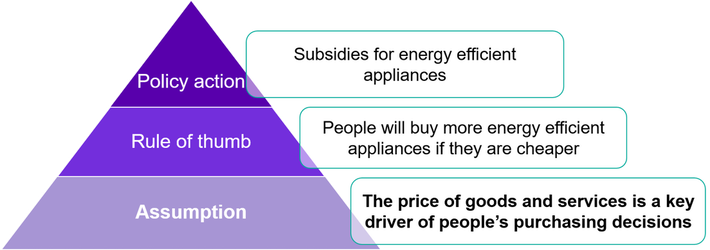
Synopsis
The Energy Sector Behavioural Insights Platform brings together government policy makers and other experts to share knowledge and experiences applying Behavioural Insights to energy policy.
The overall aim of the Task is to improve the efficacy of demand-side energy policies by ensuring that human behaviour is accounted for at all stages of the policy cycle.
Overview
Task Duration & Participation:
Phase 1: December 2019 to December 2020
Participating Countries:
Australia, Canada, Ireland, Netherlands, Switzerland, United Kingdom
Phase 2: April 2021 to December 2022
Participating Countries:
Canada, Ireland, Netherlands, Switzerland, United Kingdom
Phase 3: March 2023 – February 2025
Participating Countries:
Canada, Ireland, Netherlands, United Kingdom
Contact:
Phase 3 Task Leaders, The Behaviouralists
Latest From Behavioural Insights Platform
New guidebook: Applying behavioural insights to unlock energy demand flexibility
The Users TCP Behavioural Insights Platform has published a new guidebook titled ‘Applying behavioural insights to unlock energy demand flexibility: Guidebook for practitioners’. This guidebook provides essential guidance to policymakers and energy suppliers interested in applying behavioural insights to improve residential demand response.
BI Platform Task receives prestigious J-PAL grant award
We are thrilled to announce that the BI Platform has been awarded funding by J-PAL’s King Climate Action Initiative (K-CAI). The funding will be used to match the contributions of the Task Participants and to deepen the scope of the activities carried in Phase 3 of the Users TCP BI Platform.
Behavioural Energy Policy Toolkit presented at Energy Transformations conference
Ondrej Kacha, one of the Task Leaders of the Behavioural Insights Platform, presented the recently released Behavioural Energy Policy Toolkit at the Energy Transformations conference in Manchester in June.
Behavioural Insights Platform Publications
Applying behavioural insights to unlock residential demand flexibility: Guidebook for practitioners
This guidebook provides essential guidance to policymakers and energy suppliers interested in applying behavioural insights to improve residential demand response.
Behavioural Energy Policy Toolkit is now live
The Platform has published an online toolkit to help civil servants apply insights from behavioural science to demand-side energy programmes. Click on “Read more” to access the toolkit!
Policy Brief – Improving demand-side energy policy outcomes using behavioural insights
The Energy Sector Behavioural Insights Platform of the UsersTCP brings together government policy makers and other experts to share knowledge and experiences applying behavioural insights (BIs) to energy policy.
Subtasks & Deliverables
Although technologies are important determinants of energy demand, people’s decisions about which technologies they use, and how they use them, ultimately determine energy use. This is true for all sectors. Identifying ways to influence human behaviour will therefore be an important ingredient in clean energy transitions globally.
However, in many cases when designing and implementing energy policy, policy makers resort to “rules of thumb” about human behaviour, often based on orthodox economic theory. While these can be useful, they are not always good predictors of actual human behaviour and policies based on them can sometimes be ineffectual – a policy performance gap.
Building on existing knowledge and experience to incorporate evidence from behavioural science (or Behavioural Insights) throughout the policy cycle should help ensure that energy policies are designed to work with people’s likely behaviours, reducing the policy performance gap.
To some extent, all energy policy is designed to change behaviour: From congestion taxes to discourage people from driving in certain parts of the city, to labelling schemes that encourage people to purchase more energy efficient appliances.
However, in many countries policy makers observe a disconnect between the expected outcomes of a policy and the actual outcomes – a policy performance gap. Often, this gap is because people behave differently than the way policy makers had expected.
Energy policy makers—like policy makers in many other fields—often use “rules of thumb” when making policy, which implicitly involve assumptions about human behaviour. A typical example is this:

While this rule of thumb may work in many cases, it is based an assumption about how people respond to prices and ignores other ways people make purchasing decisions. For example, for some people, higher-priced goods might signify better quality. For these people, lowering a product’s price may make it unattractive, the opposite impact intended by the policy.
Examples such as this suggest policy makers should carefully consider evidence from the behavioural sciences when designing policy, to minimise the risk of policy performance gaps.
What are Behavioural Insights?
Behavioural Insights (BI) are designed to help make better and more effective public policies based on evidence on human behaviour drawn from the fields of behavioural economics, psychology and other behavioural sciences.
Research from these fields has shown that behaviour is often not “rational” and that habits are often guided by cognitive “short cuts” which, while useful in many situations, sometimes result in behaviours that differ from expectations.
BI is designed to help policy makers take such factors into account when designing policies, offering a data-driven and nuanced approach to policy making based on what actually drives citizens’ decisions rather than relying on assumptions about how they should act.
The emergence of Behavioural Insights in government and the need for collaboration
Over the last decade, several countries have set up specialised teams to incorporate BI within energy policy development and implementation processes. In some countries, dedicated BI teams have been established within energy or environment departments. In others, BI teams are established in central agencies to apply BI across a portfolio of issues, including energy. In others still, BI analysis has been conducted by private or semi-private organisations, with government as the primary client.
While some countries have been applying BI to energy policy for years, others are just beginning to experiment with it. International collaboration can help ensure that countries share lessons learned and pool their efforts to improve the efficacy of energy policy globally.
1. Overall objective: Improve the efficacy of demand-side energy policies by ensuring that human behaviour is accounted for at all stages of the policy cycle.
2. Build an international network of energy policy makers that use or are interested in using BI for energy policy.
3. Support energy policy makers in understanding the behavioural assumptions of different policy instruments.
4. Share lessons learned and identify best practices, from inside and outside the energy sector, in applying BI throughout the policy cycle and in both advanced and emerging economies.
In Phase 3, the Platform will engage in three workstreams:
Workstream 1: Developing and testing real-world interventions that nudge consumers towards demand flexibility, and which can be applied at scale and at a low cost.
The Platform will work with participating countries to identify a suitable partner in each country (e.g., utility, distribution system operator, or a government-funded initiative) that would work with the BI Platform on designing and implementing a behavioural trial to promote demand flexibility.
The behavioural trials might focus on the following types of outcomes: increasing consumer adoption of time-of-use and type-of-use tariffs, increasing consumer adoption of DER automation technologies, increasing adoption of a particular technology that enables demand flexibility (e.g. smart metering devices, PV panels, energy storage systems), redesigning the human-technology interfaces (e.g. online customer smart meter portals) to better encourage demand shifting, or encouraging consumers to join energy communities.
Workstream 2: Developing a best-practice guidebook for policy teams on applying behavioural insights to build flexibility potential among consumers
This activity will involve conducting an extensive review of available evidence. The review will be led by the Task Leader, with the experts from the participating countries being expected to participate. The findings from the evidence review will serve as the basis for developing the behavioural trials. The review, as well as the trial findings, will be synthesised into best-practice recommendations for policymakers and practitioners on how to develop behaviourally informed programs that increase demand flexibility.
Workstream 3: Creating a community of policy experts and practitioners interested in applying behavioural science to increase demand flexibility
The Platform will leverage its existing links to bring together policymakers, regulators, and practitioners interested in the intersection of behavioural science, energy policy, and demand flexibility. Working with this community, the Platform will regularly organise webinars, invited talks, and flash talks to attract a large number of practitioners and facilitate knowledge exchange.
Phase 3 of the BI Platform brings together a diverse mix of experts: policy makers, energy suppliers, behavioural scientists and renowned international non-profits. Participants will gain access to this expert network with a joint aim: developing more effective demand flexibility programs through the application of behavioural insights.
Task participants will also get to co-design a large scale field trial in their country, working with local implementation partners and behavioural scientists who had run hundreds of real-world experiments in the past.
All outputs produced by the Platform (see Deliverables) will be directly shaped by the participating countries, ensuring maximum applicability to their national context.
Phase 3
| Number | Title | Audience | Format | Timing |
|---|---|---|---|---|
| 3.1 | Guidebook for policy makers summarizing behavioural barriers and drivers of demand flexibility | Global | Guidebook | Q1 2024 |
| 3.2 | Behavioural insights and demand flexibility: workshops and webinars | Global | Some events reserved for task members only | In-person and online events | Q1 2024 – Q2 2025 |
| 3.3 | Report summarizing the results of field trials in participating countries | Global | Research report | Q1 2025 |
Phase 2
| Number | Title | Audience | Format | Timing |
|---|---|---|---|---|
| 2.1 | Behavioural energy policy toolkit | Global | Interactive website | Q1 2022 |
| 2.2 | Behavioural energy policy MOOC | Global | Videos and exercises | Q2 2022 |
| 2.3 | Workshops and webinars | Users TCP members and other national behaviour/energy sector experts | In-person/Online workshop. Location tbc. | Q3 2022 |
| 2.4 | Phase 3 work plan development | Task participating countries | 3-5 page electronic document | Q4 2022 |
Phase 1
| Number | Title | Audience | Format | Timing |
|---|---|---|---|---|
| 1.1 | Summary briefing note | IEA Global Commission on Urgent Action for Energy Efficiency | A short, briefing note of 1-5 pages | Q1 2020 |
| 1.2 | Environment scanning full report | Global | Electronic document and/or website [tbc] | Q3 2020 |
| 1.3 | Workshop: Environment scanning report results | Users TCP members and other national behaviour/energy sector experts | In person workshop. Location tbc. | Q3 2020 |
| 1.4 | Workshop report and recommendations | Task participating countries | 5-10 page electronic document | Q4 2020 |


